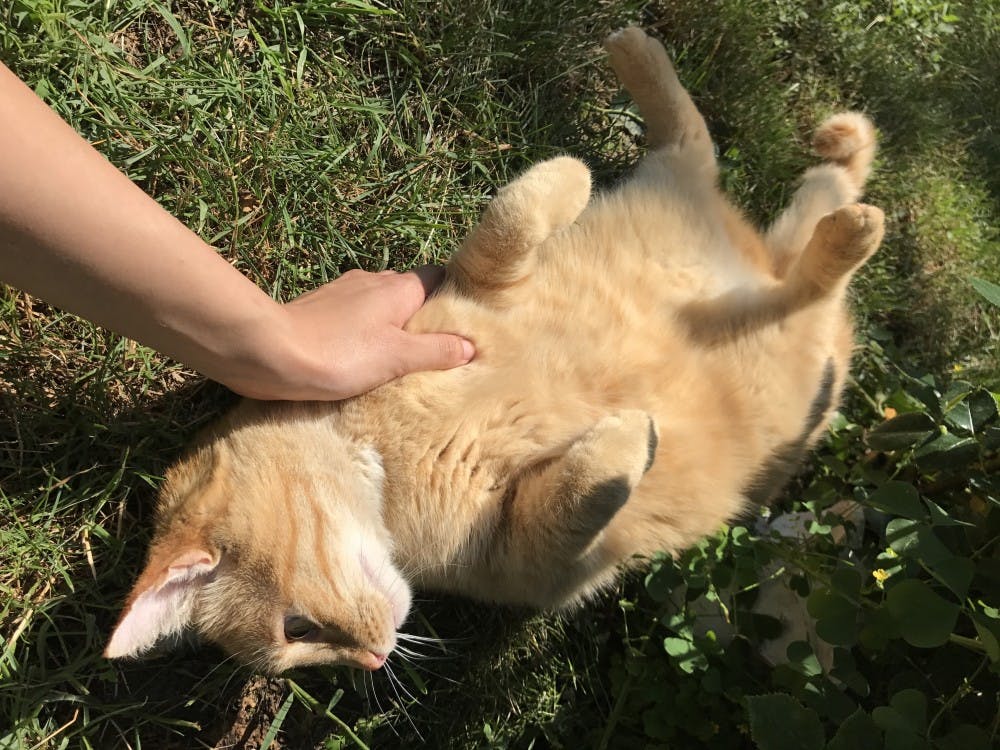Students often feel homesick in college. They miss their family, their home, the comfort of a bed more familiar than a lofted Twin XL mattress and, perhaps most of all, their pets.
Not all hope is lost, however. ASU provides several ways in which students can have animal interaction and experience the mental health benefits that these interactions can provide.
A clear solution is often the most common one, as many students manage to bring their cats and dogs into the dorms for emotional or physical support purposes.
Ronald Broglio, an associate professor of English at ASU, has done research on the interactions between humans and the environment and supports the movement of animals to college campuses.
“I think it’s great,” Broglio said. “Animals calm people often times, and certainly in the stressful environment on campus it’s helpful. But I also know that pets help build community — people like to go over and pet a dog, and that allows us to interact with humans in ways we might not otherwise.”
Studies have shown that animals can have therapeutic effects on the people they interact with.
However, there do exist some issues with having pets on campus.
Many dogs are not recommended for apartment life, and with dorms being significantly smaller than the average apartment, there is hardly room for students and their pets to coexist.
Furthermore, many students have allergies. Even if a roommate is not allergic to a student’s pet, dander has the tendency to linger even after extensive cleaning, creating potential issues for both current and future residents of the room.
“I actually see the problems of having a pet on campus as an opportunity to think about the nonhuman world and ways that animals occupy space,” Broglio said. “You have to pick up after your dog, so people are thinking about the shared spaces between humans and animals … There are all these things that we might take for granted about how we build that space that having pets on campus might change that.”
While it is not always feasible for students to bring pets to campus, there are still opportunities for students to fill the void of no longer having a pet at arm's length.
At ASU, there are programs and events for students to be around animals and give back to the community while alleviating some of the stress of being a college student.
The La Gattara Cat Lounge and Boutique, a cat café located near ASU’s Tempe campus, may also be an outlet for students to relieve stress in a way that is also beneficial to the cats themselves — the café offers packages for students and also puts these cats in a safe and nurturing environment in which they can interact with people and potentially also find their forever homes through the café’s adoption program.
Broglio also pointed out that the pre-existence of animals on campus, such as birds and insects, provides potential for educational and reflective experiences.
“We need exposure to more animals and different types of animals ... If we bring animals on campus we need to do it in an interesting way which is respective to the animals,” Broglio said. “Having animals on campus allows us to think about the more-than-human world and our responsibilities. They are an important part of education. If we think about what it means to learn, it means having encounters that take us outside of ourselves, and animals help us to have those kinds of encounters.”
For students who are unable to bring their pets to college, there are still many avenues to combat stress, alleviate homesickness and learn more about their responsibilities towards the natural world.
Reach the columnist at kalbal@asu.edu or follow @KarishmaAlbal on Twitter.
Editor’s note: The opinions presented in this column are the author’s and do not imply any endorsement from The State Press or its editors.
Want to join the conversation? Send an email to opiniondesk.statepress@gmail.com. Keep letters under 500 words and be sure to include your university affiliation. Anonymity will not be granted.
Like The State Press on Facebook and follow @statepress on Twitter.




